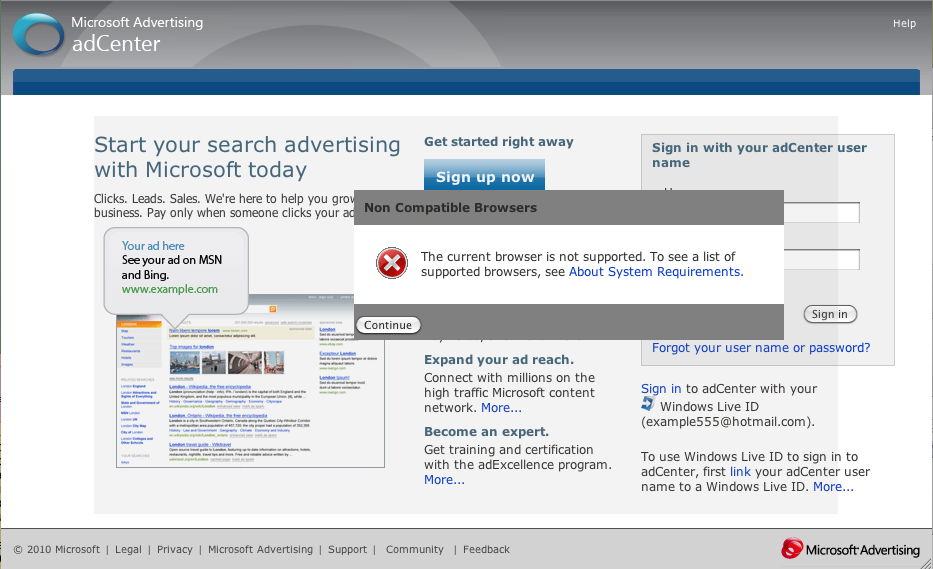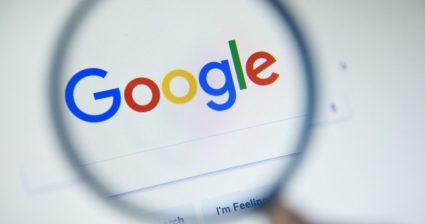
The adCenter/YSM merger could be a scary turn of events!
Anyone with a pulse and a Yahoo Search Marketing (YSM) or Microsoft adCenter account is aware of the upcoming merger between the two platforms. There is a lot of speculation and conjecture about what will become of online advertising campaigns driven by these channels and information from Yahoo and Microsoft has been unsatisfying at best. One thing is certain, though, the potential for disaster here is real and that’s very, very scary.
Yahoo and Microsoft have competed somewhat less than admirably with Google in the battle for online ad supremacy. Many factors have played a role. Google has had a stranglehold on domestic search market share and this has led advertisers to think of AdWords as a means of reaching consumers well before YSM and adCenter. Google has also actively and continually upgraded the AdWords interface and tools. This has led to people with limited marketing or technical knowledge gaining confidence in running their own campaigns. Yahoo and Microsoft, have been much slower in rolling out improvements.
Because of this, there is a huge disparity in the usability and functionality of the big three search marketing channels. Google, with its incredibly user-friendly AdWords interface, along with its host of tools (e.g. keyword tool, ad planner) and reporting options has distanced itself as the clear number one; YSM is a distant second. However, what many people who haven’t worked with adCenter with a complicated account don’t know is that adCenter is at least as far behind YSM as YSM is behind AdWords.
The upcoming deal between Microsoft and Yahoo will mean that adCenter will be taking over for YSM. The accounts will be reconciled somehow and users that had an AdWords account, a YSM account and an adCenter account will be left only with AdWords and adCenter accounts. With this in mind, I present to you…
The Top 5 Scariest Things about the adCenter/Yahoo Search Marketing Merger:

Juggling accounts is tougher in adCenter than YSM or AdWords
5. Difficulty Managing Multiple Accounts
Okay, this one is more likely to affect agencies and a small handful of clients than the average advertiser, however, it’s still a problem. In AdWords, the Master Client Center makes separating and managing multiple accounts a breeze. You can link, unlink and link back accounts with ease and in seconds. No paperwork is necessary, billing is kept separate and API access is easy to engage. Yahoo’s Master Account system is flawed in its inability to unlink already linked accounts, but it still beats logging in and out of different accounts and keeps all of the accounts managed in one place without paperwork. With adCenter, there are several limitations. First of all, a single credit card can only be associated with five accounts. I’ve not heard an explanation for this but it has posed problems for our clients in the past. Second of all, adCenter’s version of a Master Client Center is burdensome to set up, requiring IOs be sent to all parties and making it difficult to link in already existing accounts. It’s not that it’s impossible to work with Microsoft, it’s just that it seems to be more difficult than it needs to be, certainly much more difficult than with Google. Because of the market share discrepancies between Google and Bing, many advertisers may just focus on Google and ignore adCenter altogether. I hope that Microsoft will realize that although Yahoo’s system is not perfect, it’s better than what adCenter currently has.
4. Lack Of Revenue Tracking
It’s 2010 and an advertiser still can’t track revenue with adCenter’s conversion tracking pixel. It’s a cinch in Yahoo and it’s even easier in Google. Google even makes tracking multiple conversion types (e.g. leads, sales, newsletter signups) easy to do. Most agencies get around this by using a third-party or proprietary tracking pixel but that’s not an option for many independent advertisers. Many advertisers will use Google Analytics to sort out their revenue tracking, and that’s a fine option, but it makes management of adCenter that much less efficient. Whereas in AdWords and YSM one can clearly see revenue numbers right along side keywords without running a report, adCenter users will have to dart back and forth between their analytics and their keyword bids. This sort of hassle could lead advertisers to shy away from adCenter altogether or to simply run campaigns at low spend for fear of inefficient allocation of resources.

Welcome to adCenter… unless you aren’t using IE, of course.
3. Browser Incompatibility
About 60% of Internet users in the United States use Internet Explorer. That’s good news for Microsoft because Internet Explorer is the only browser that works properly with adCenter. The bad news is that that still leaves a huge 40% chunk of Internet users that don’t use Internet Explorer. If those users want to continue to advertise in Yahoo and/or Bing without potential incident, they may have to choose to abandon their favorite browser**. To date, Microsoft has just assumed that users would kowtow to this ridiculous demand, however, with Microsoft reinvesting in search, it would make sense that they would take a cue from Yahoo, Google and the rest of the Internet and make sure that everyone can use adCenter, regardless of browser or computer type. By the way, did I mention that none of the desktop tools work with Macs? Because they don’t! If Microsoft has taken pains to make sure that Bing works on every system, ensuring that users can click on ads displayed in Bing so that Microsoft can make money, why hasn’t Microsoft taken the same tact with their advertising interface? Will this change with the merger? We can only hope.
2. Weak Support
We have a customer support representative at Microsoft who is pretty terrific; he’s exceptionally competent and he’s timely with his responses. Unfortunately, whenever he has to pass us along to someone else–which is often the case with adCenter–it’s usually the beginning of a wild ride. I’ve had situations where getting a client’s working credit card off of credit hold has taken over a week and three different handoffs to different support representatives. I’ve tried using the general support channels with adCenter and the results are even worse. Furthermore, Microsoft establishes the level of support that one can access when the account is created. I’ve asked for help with a client’s account and been told, “When I ran this particular account by my business desk I was told this falls into our standard support tier. For future support questions about support of this account, you’ll need to go through the adCenter standard support queue.” This would be an unfathomable circumstance in Yahoo and Google where our reps fall over themselves trying to be of assistance. Since most users will be forced to use the general support channels anyway, this may not concern to them, however, the attitude toward customer service at Microsoft is certainly much more focused on passing off customer issues than solving them. A lot of people will have a lot of issues at the time of the merger; will Microsoft be up to the customer service challenge or will it lose even more advertisers to Google-only marketing campaigns?

How slowly will Microsoft roll out changes after the merger?
1. Slowness To Upgrade
Google never rests when it comes to finding ways to improve. “If it ain’t broke, don’t fix it,” is not an aphorism that you’ll find posted anywhere on Google’s Mountain View campus. Google has the best product but they constantly strive to improve it, widening the gap between AdWords and YSM and adCenter month after month. Yahoo and Microsoft have been slower on the uptake. I hope against hope that Microsoft will address the aforementioned concerns with the merger, however, if the past is any indication of the future, the resulting YSM/adCenter hybrid will rest on its laurels for quite a while afterwards. Do me a favor: without using a desktop tool, try to change the default bid in ten ad groups in AdWords, then YSM, then adCenter. That operation will take about 20 seconds in AdWords, about 30 seconds in YSM and at least 5 minutes in adCenter… and this is a known problem! How much faith can we have that Microsoft will have timely solutions for all of the problems that will arise from the merger and the problems that will develop thereafter? In my mind, a problem doesn’t even have to be an impediment to advertising, it can simply be a shortcoming for which Google offers an easier solution and there are countless examples of this. No matter how much improvement comes from this merger, the eventual success or failure will depend on the amount of resources that Microsoft dedicates to keeping the new adCenter a viable competitor to AdWords. Thus far, Microsoft has seemingly ignored adCenter, despite the launch of Bing. If adCenter is going to have a future, that will have to change in a big way.
There are three things of which I am certain with regards to the upcoming merger between the YSM and adCenter platforms: it’s definitely going to happen, it’s going to be a little dicey at first when it does and it’s absolutely terrifying to speculate on how much can go wrong. For as much as I have been disappointed by adCenter to date, I still hold out hope that this merger is a good thing. Google needs competition from a real peer in order to better the search marketing medium for customers and advertisers alike and Microsoft is that caliber of peer. If Microsoft can realize how important the search space can be, then this frightening upcoming event could end up being the best thing to happen to search marketing since conversion tracking. Until it happens, though, I’ll be watching the events as if I were watching It when I was five years old.
**Firefox tends to work in a somewhat buggy fashion with adCenter, but there is no guarantee that it will work at all in the future or after the merger.







Responses